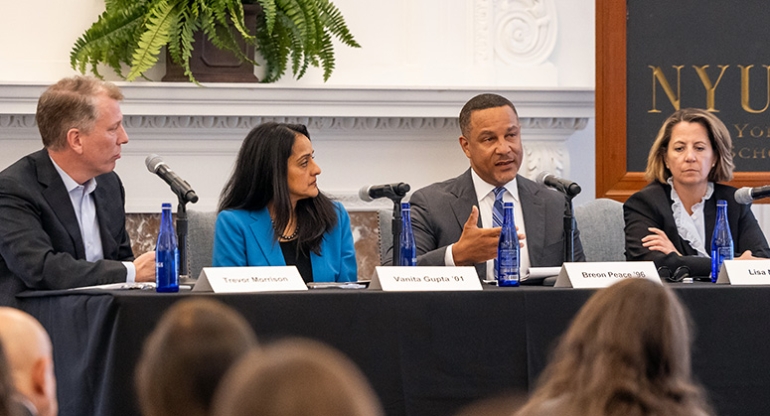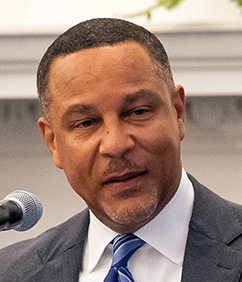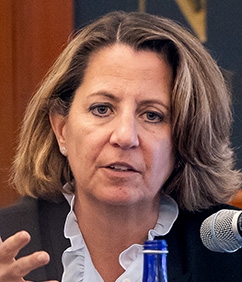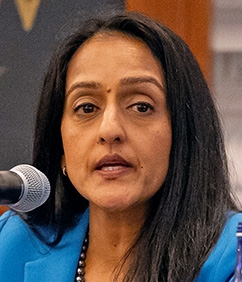Former Justice Department attorneys discuss politicization of the agency at NYU Law Forum
The politicization of the US Justice Department was the focus of a March 5 NYU Law Forum featuring former DOJ attorneys and co-hosted by the Reiss Center on Law and Security. Under discussion was the dismantling of post-Watergate practices that had served to insulate the Justice Department from political interference. The panel included experts with firsthand insight into the agency’s inner-workings: Distinguished Scholar in Residence Vanita Gupta ’01 is a former US associate attorney general; Breon Peace ’96 is a former US Attorney for the Eastern District of New York; and Distinguished Scholar in Residence Lisa Monaco is a former US deputy attorney general. Dean Emeritus Trevor Morrison, Eric M. and Laurie B. Roth Professor of Law, served as moderator.
and Lisa Monaco.
The discussion examined developments such as the Trump administration’s removal of career officials and the release of memos that have upended longstanding prosecutorial objectives—including one directive that called for de-prioritizing white-collar cases.
In addition, the forum explored the Justice Department’s controversial decision to drop its criminal case against New York City Mayor Eric Adams, who was accused of corruption and campaign finance violations. (Adams pleaded not guilty.)
“We’re also seeing in Washington, DC a different type of thing playing out where [the] US Attorney is asking career prosecutors to open investigations that they don’t believe there is a predicate for,” said Gupta. She cited the resignation of Denise Cheung, who stepped down as head of the criminal division of the US Attorney’s office in Washington, DC after being directed to open a criminal investigation into Biden-era Environmental Protection Agency grants. “Most people in the American public may not understand, but [this] is actually quite distressing for those of us who know how the department works,” Gupta said.
Selected remarks from the panel discussion:
Breon Peace: “The norms that my colleagues spoke about are designed to insulate those of us who are in positions to make those decisions about who to prosecute, what crimes to enforce, etc., without improper influence, as Lisa mentioned.… These norms are also designed to instill public confidence in the body that is administering justice around the country to build and maintain public trust. And if the public believes that the decisions being made by people in our seats and people around the country are driven by political influence or racial animus or personal interests with respect to wealth or other issues, you lose all confidence in the system.” (video 13:44)
Lisa Monaco: “In the long-term, the disincentivizing and the kind of denigration of the civil service is [something] I really worry about [with] the long-term implications there. Who is going to be willing to devote their lives to public service if we are going to be in a cycle of every four years it just gets upended? [Some] 115,000 people work in the Justice Department. The entirety of political appointees [is] 4,000. So just doing the math, the number of political appointees in the Justice Department of that 115,000 is infinitesimal. We rely on people willing to serve and devote their lives to public service and to build up that expertise. So if we lose that, it’s going to have profound implications.” (video 1:06:08)
Vanita Gupta: “One thing I don’t know is how many people outside of Washington DC and law schools care about what’s truly happening at DOJ. And how do you make people understand what’s at stake on these broader [issues]? You talk about the rule of law and democracy—and apparently we didn’t really know how to talk about that in ways that felt real for people in their homes when they’re dealing with not being able to get groceries within their budget and stuff. So this is a big quandary, I think, for those of us in the legal community and in the media as a [communications] piece to make people understand why this matters to who we are as a country.” (video 1:10:15)
Watch the full video of the NYU Law Forum:
Posted May 6, 2025





